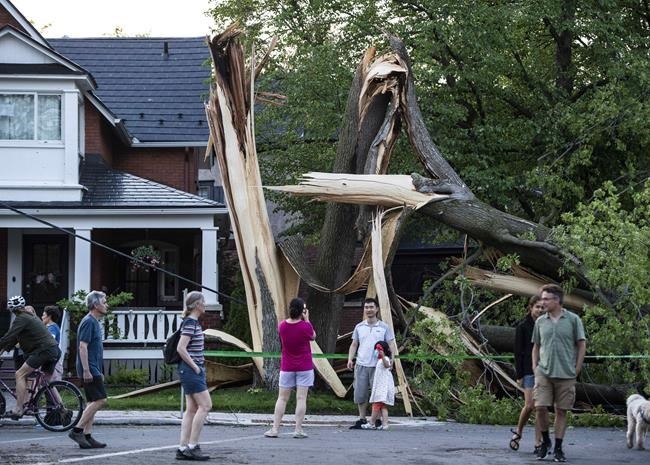Hundreds of thousands of people remain without power after Saturday's powerful storm that left at least nine dead and caused extensive damage throughout southern Ontario and Quebec.
Hydro utilities say the damage to the power grid is extensive and complicated, meaning even as crews work around the clock to make repairs, it could still be days before all outages are resolved.
Hydro One reports the number of customers without power in Ontario has dropped a little below 200,000 as of Monday morning, having restored power to more than 380,000 customers.
Across the provincial border, Hydro-Québec had around 1,500 outages affecting more than 215,000 customers.
Provincial Energy Minister Jonatan Julien held a last-minute news conference Monday morning, saying the goal is to re-establish power to 80 per cent of people before the end of the day.
Hydro Ottawa said it had restored power to more than 70,000 customers as of mid-morning Monday, while an estimated 110,000 are still without power.
The utility said the damage is significantly worse than the 1998 Ice Storm and the tornadoes of 2018, adding it has brought in crews from as far as the Toronto area and New Brunswick to assist in repairs.
"The level of damage to our distribution system is simply beyond comprehension," Hydro Ottawa said on Twitter Monday. "We’re managing this from a whole of city perspective given that no single area of the City is unaffected in some manner."
Hydro-Québec said the storm left 550,000 customers from Gatineau to Québec City in the dark at its peak.
"Part of the outages that persist may take longer to fix, due to difficult access conditions, extensive damage to the network and the scale of damage to pick up," Hydro-Québec said in a statement Monday, adding that 600 teams had been deployed.
The storm tore through southern Ontario and Quebec in a matter of hours, breaking hydro poles and toppling towers, uprooting trees, and ripping shingles and siding off houses.
The total death toll from Saturday's storm is still unclear, but police in Ontario reported seven people killed by falling trees in locations across the province during the storm Saturday, and an eighth killed by a falling tree branch in the storm's aftermath on Sunday.
A ninth person died Saturday when the boat she was in capsized on the Ottawa River near Masson-Angers, Que.
The widespread damage prompted the Ontario towns of Uxbridge, north of Toronto, and Clarence-Rockland, east of Ottawa, to declare states of emergency.
Prime Minister Justin Trudeau said in a statement Sunday that the federal government stands ready to provide support if needed.
David Sills, executive director of the Northern Tornadoes Project at Western University, said wind speeds from the storm could have reached much higher than the 132 kilometres an hour measured by Environment and Climate Change Canada, given the concentrated damage.
Teams from the project travelled to the Uxbridge area as well as to southern Ottawa to assess whether they were hit by tornados, but the project issued a tweet on Monday saying it will require a thorough analysis before classifying the event given the complexity of the damage.
This report by The Canadian Press was first published May 23, 2022.
The Canadian Press
